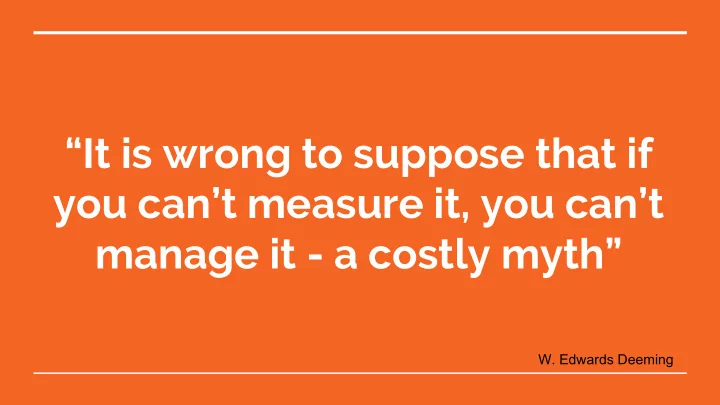

“It is wrong to suppose that if you can’t measure it, you can’t manage it - a costly myth” W. Edwards Deeming
“If you can’t measure it, you can’t improve it” Lord Kelvin
Technical Debt for Linux-based distributions: Estimating what you are missing Linux Foundation Open Source Leadership Summit Tahoe, CA (USA) February 14th 2017 Jesus M. Gonzalez-Barahona (URJC & Bitergia) Paul Sherwood (Codethink) speakerdeck.com/bitergia
Outline Some context Why debt for distros Approach Current results Next steps
Some context
/Jesus My two hats: Like five years ago I I work at Universidad Rey was having coffees Juan Carlos... with the gang of Bitergia founders ...researching about software Involved in the development company since then gsyc.es/~jgb bitergia.com
/Paul Currently… Previously... Codethink CEO Teleca Founder and shareholder cmdline tools + VCS Consultant + Project Manager troubleshooter “The Software Baserock contributor Commandments”
Why debt for distros
Context Develop/integrate/test software ● Employ/fund others to do that too ● (Paul’s POV) Offer teams to large customers ● Advise on business impacts of FOSS ● Recommend *using* FOSS ● See lots of projects *misusing* FOSS ● EOL versions ○ Long local forks, not upstreamed ○ Notice Year 1 practices hurt Year 2..Year 20 ● Wonder why… maybe because ● Year 1 metrics are obvious (developer costs vs delivery date) ○ Later metrics are a mystery... ○
Unanswered: when should we update?
Unanswered: when should we update?
We’re not talking about updating just a few components...
Typical IVI project approaching 1000… Which ones do we need to upgrade? How often do we need to re-decide?
Example Project started on 3.8.x kernel in 2012 ● Plus custom drivers ○ Went live three years later on same 3.8.x ● Plus custom functionality ○ Plus thousands of fixes backported ○ As the years go by ● Developers move on - no-one understands the ○ custom stuff Cost of backporting increases ○ New variants need new features (eg virtualization) ● Cost of backporting from later kernels increases ○ Eventually one of the releases DEMANDS an update
Example continued Development Maintenance
When to update What you risk by What you risk or lose upgrading by not upgrading
When to update The balance may change suddenly over time
Rationale Technical debt is a popular concept ● … but not for third-party software ● … and not for FOSS ● Distros are large third-party software sets ● Distros update constantly ● Distro users often do not ● Cost of updating is perceived high ● Cost of not updating is unknown ● Can we even **find** metrics for this?
- Delta vs mainline - For individual components, and Approach - For whole stack: - distros What to measure? - custom assemblies/stacks
Defining “Gold standard”
The different kinds of gold Goals Scenarios Candidates (examples) Stability Isolated system, Debian frozen stable functionality Functionality Cloud Latest application upstream Security Upgradable Stable embedded upstream
Comparing Upstream master with upstream Upstream 2.x 2.1 1.4 2.0 Distro packages Deployed packages
Comparing Upstream master with upstream Upstream 2.x (no updates) 2.1 1.4 2.0 Distro packages Deployed packages
Comparing Upstream master with upstream Upstream 2.x (late updates) 2.1 1.4 2.0 Distro packages Deployed packages
Comparing Upstream master with upstream Upstream 2.x (new package) 2.1 1.4 2.0 3.0 Distro packages ?? Deployed packages
Compare “most likely upstream equivalent” 2.1 1.4 2.0 3.0 ??
Compare “most likely upstream equivalent” with HEAD 2.1 1.4 2.0 3.0 ??
Difference is “technical lag” with “gold standard” 2.1 1.4 2.0 3.0 ??
How to measure difference 1.4 2.0 2.1 3.0 Lines of code Number of functions, classes Number of bugs fixed Number of security bugs fixed Number of issues closed Time for benchmark runs Unit test coverage Results in integration tests ...
Current results
Debian Git releases, lag in November (lines, files)
Debian Git releases, lag in Nov. (commits)
Normalized effort For each developer: (in days) number of days with at least one commit For a project: sum for all developers
Debian Git releases, lag in Nov. (normalized effort)
Next steps
Application Debian packages in a virtual machine to many domains Python pip packages in a deployed container JavaScript npm modules in a web app Yocto packages in an embedded system
Definition of Different “golden standards” details, according to Different metrics for lag requirements Different aggregations Software for automated computation of lag per component (and dependencies?)
Credits
Images “Gold”, by Michael Mandiberg “Jenga distorted”, by Guma89 at CC Attribution-ShareAlike 2.0 WikiMedia Commons https://flic.kr/p/6feTT2 CC Attribution-ShareAlike 3.0 “Gold philarmonic”, by Eric Golub https://commons.wikimedia.org/wi CC Attribution-ShareAlike 2.0 ki/File:Jenga_distorted.jpg https://flic.kr/p/7csHXG “Balance scale”, by winnifredxoxo “Plymouth”, by Dennis Jarvis at Flickr CC Attribution-ShareAlike 2.0 CC Attribution-ShareAlike 2.0 https://flic.kr/p/5pqT72 https://flic.kr/p/9LdVCR
Recommend
More recommend